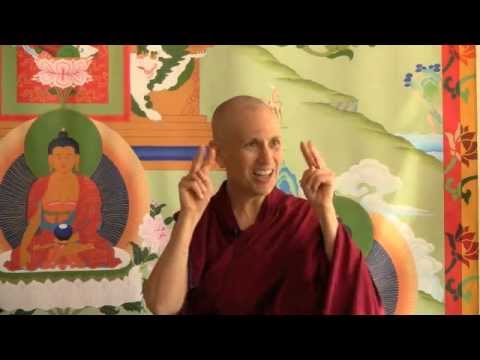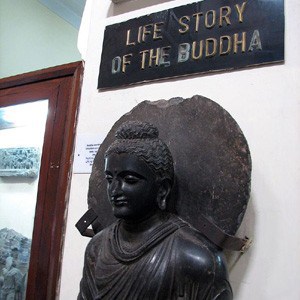Look into your own mind
Part of a series of short Bodhisattva's Breakfast Corner talks in response to a letter from a German student concerned about the growth of the Muslim community in Germany and the fear he often feels as a result.
- We should avoid generalizing a group of people and then developing bias against them
- We need to separate the people and the views that we think they hold
- We should turn the mirror on ourselves by looking at ourselves and our own intolerance and prejudices
Look into your own mind (download)
So, one thing our friend’s email was saying that somebody had told him that if he is intolerant against the other people’s intolerance, things will work out well; but if he is tolerant of their intolerance, then things won’t work out well. In other words, with his fear and anxiety—this whole thing he’s made up in his mind about the Muslims—if he is intolerant of their view and fights … It was very interesting. It wasn’t clear in his email whether he was separating out that view or the people who hold the view. It seemed to be if he was intolerant of the people he thinks are holding a view and acts against those people, then it will work out well. Okay?
So, there are many elements in this kind of thing that are completely wrong. First of all, we need to separate the people and the view that we think they hold. But even before we do that we have to look at this whole thing of generalizing and making everybody who has a certain characteristic into a huge group and then being biased against them. Okay? So this kind of prejudice that is going on in his mind—and I think he realizes this, he says that he’s a Buddhist, he wants to think differently of putting all the Muslims together, but, you know, they’re all kind of going to shatter our democracy and create Sharia law, whatever the mind is going on. This whole thing of putting all people who hold a certain religious faith in a box and imputing traits to them, this is something that is so dangerous and so vile. So when we see it in our own minds, we really have to do something about it, because this is the whole thing that lay behind the holocaust, it’s the whole thing that lay behind what went on in the genocide in Rwanda, it’s the whole thing that lies behind so many racial and ethnic problems. It’s when people just divide others into groups, hold onto that identity, impute characteristics and views on the other and then hate them. Okay?
And so we all have this tendency. We learn very early as children to put things that look alike in a certain box. Even when we’re in kindergarten, anything that has three sides, we put together here—they have some similarities—anything that has four sides, goes over here. We learn to categorize. It’s a very useful skill just in ordinary daily life. But to do this kind of thing—sometimes, okay, women go in one bathroom, men go in another bathroom, you know, there are reasons for categories. But the thing that doesn’t work is when we impute meanings on those categories that they don’t have. So, in this case, all Muslims think x, y, z, and then not only imputing what he thinks they think now, but also imputing what he thinks they’re going to do in the future. When first of all, not knowing at all what these people think, and second of all, not knowing at all what they plan to do in the future. And we can never take a whole group of people and think that they are exact carbon copies of each other, and you really learn that living in a monastery. Sometimes, people think, oh, all these monastics—they wear the same clothes, they have the same haircut, they have the same religion—they all must be alike. Well, you probably notice from your not-even-a-week here that we are very different. And we don’t come out of a cookie-cutter pattern. So let alone this kind of thing in any kind of larger group, we can’t impute qualities like that, you know? It’s just not right. And this is the same kind of mind that has lain behind so much pain in this world and so much warfare.
And especially categorizing people in terms of religions. I studied history in college, and that was the thing that became very clear to me is people were killing each other every generation in the name of God. For what purpose? It’s very clear that those people don’t even understand their own religion that they’re claiming to defend. So, if people are looking at Muslims and saying, “Oh, they’re all thinking this way and they’re going to do like this,” then actually the people who are imputing that on the Muslims are doing the exact same thing they’re accusing the Muslims of doing, which is developing a group, having a group identity and imputing false views on them. Okay?
So, it’s not a thing, you know, what he said about opposing—being intolerant of people who have a certain view. It’s not a thing of being intolerant against the people. First of all, we don’t know if all those people in that category even have that view. They probably don’t. Second of all, the intolerance should be against any kind of view that puts people in categories and wants to harm them because of that category. So, if you’re going to accuse others of being intolerant of you because they’re Muslim and you’re not, then you have to look at yourself and say, “I am intolerant of them because I’m whatever religion I am, and they are not. They are other, they are different.” Okay? So what it boils down to is we’re having the exact same mental state, you know, as we’re accusing the other people of having. So, if we want to stop intolerance, we have to be intolerant of our own intolerance. So if we are intolerant of our own intolerance—in other words, if we then do something to remove it, like I was saying yesterday, you know, the quote from the Buddha about “Hatred is not solved by hatred, but by love,” and so we try to cultivate love, recognizing that other people have not always been that way, or whatever technique we use, then we’ll be successful against our own intolerance. And when we are not intolerant, then we can approach the other people and become friends with them and see that they all don’t fit into a group, that they’re all individuals, and that we can’t just throw people in a group and throw them out the window together.
So it’s always a thing of looking back on ourselves, and this can be quite a difficult and painful process, to see our own intolerance, to see our own prejudice against different groups. It’s not pleasant to see in ourselves, but it’s something we have to look at and overcome. And that work needs to be done in ourselves because, you know, it doesn’t matter who has hatred, who has intolerance, it’s something to eliminate. But we have a better chance of eliminating our own than anybody else’s, so we have to start with ourselves. And when we eliminate our own, then we can really help people eliminate whatever intolerance they have.
Venerable Thubten Chodron
Venerable Chodron emphasizes the practical application of Buddha’s teachings in our daily lives and is especially skilled at explaining them in ways easily understood and practiced by Westerners. She is well known for her warm, humorous, and lucid teachings. She was ordained as a Buddhist nun in 1977 by Kyabje Ling Rinpoche in Dharamsala, India, and in 1986 she received bhikshuni (full) ordination in Taiwan. Read her full bio.


